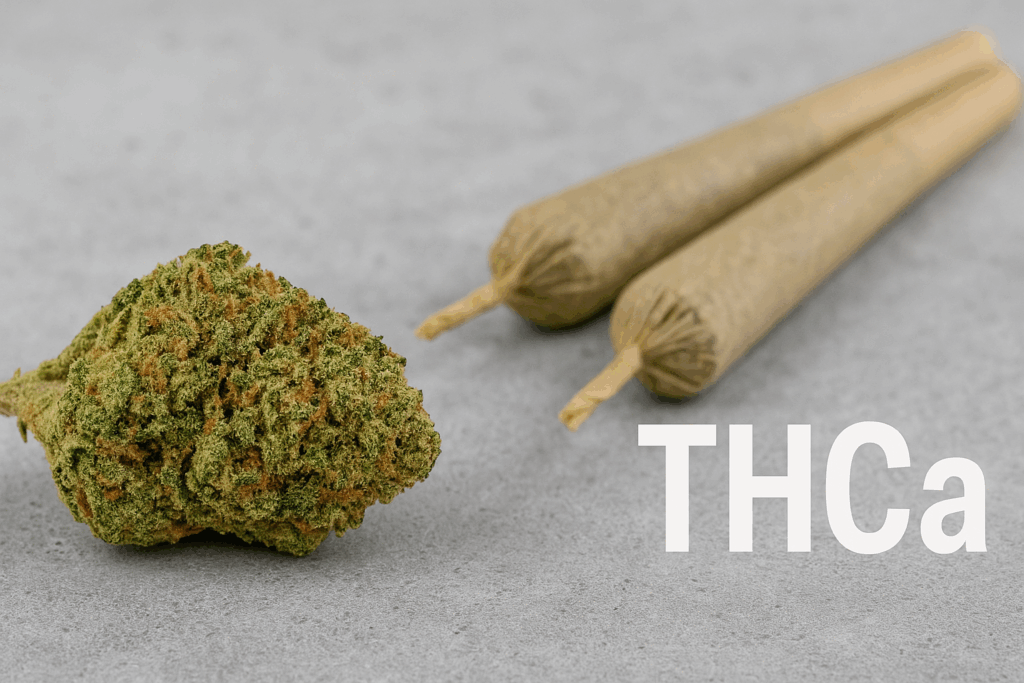THCa stands for tetrahydrocannabinolic acid. It’s the raw, non-psychoactive precursor to THC, found naturally in live or freshly harvested cannabis plants. When heated, THCa converts to THC through a process called decarboxylation.
THCa does not produce intoxicating effects in its natural state, while THC is psychoactive and causes the “high” associated with cannabis. The two compounds have similar chemical structures, but THCa contains a carboxylic acid group that must be removed with heat to become THC.
No, THCa does not cause a high when consumed raw. It only becomes psychoactive after being exposed to heat, which turns it into THC.
When THCa is heated—through smoking, vaping, or cooking—it undergoes decarboxylation, a process that removes a carbon dioxide molecule and transforms it into Delta-9 THC, which is psychoactive.
THCa can be consumed raw by juicing fresh cannabis leaves and buds, used in smoothies, or taken in tinctures or capsules. When smoked or vaped, it converts to THC and produces intoxicating effects.
Research suggests THCa may have anti-inflammatory, neuroprotective, anti-nausea, and anti-proliferative properties. While more studies are needed, some users report relief from conditions like arthritis, muscle spasms, and nausea.
THCa exists in a legal gray area. Under the 2018 Farm Bill, hemp-derived products are legal if they contain less than 0.3% Delta-9 THC. However, some states have begun regulating or banning THCa flower due to its potential to convert into psychoactive THC.
Yes. Even though THCa itself is not psychoactive, it can convert into THC in the body or when smoked, which may result in a positive drug test for cannabis use.
Not unless it is heated. Raw THCa flower will not make you high, but once smoked or vaped, it becomes THC and can produce strong psychoactive effects.
THCa flower is cannabis that contains high levels of THCa and very low Delta-9 THC. It’s often sold as “compliant” hemp but becomes psychoactive once smoked or otherwise heated.
Yes, THCa is one of the many cannabinoids produced by the cannabis plant. It plays a key role in the plant’s natural biochemistry and is the chemical precursor to THC.
Yes. When cannabis is heated during baking or cooking, THCa converts into THC. This makes it ideal for making edibles, oils, and infused butters.
Raw THCa flower has an earthy, herbal taste and lacks the strong flavor of burned cannabis. When heated, it develops the fuller terpene profile typical of smoked THC flower.
THCa flower can be just as potent, or even more so, than typical THC flower after decarboxylation. THCa percentages often range from 20–30%, translating to comparable levels of THC when activated.
Decarboxylation is the process of applying heat to cannabis to activate THCa and convert it into THC. Without this step, cannabis will not produce the psychoactive effects many users seek.
Yes. THCa is generally considered safe when consumed raw, though as with any supplement or plant compound, it’s best to consult a healthcare provider, especially if you have underlying conditions.
While not yet fully studied, some users report that THCa promotes relaxation and sleep without the high of THC. Its anti-inflammatory properties may also contribute to a sense of calm.
A high THCa content indicates that the cannabis has strong psychoactive potential once heated. For example, a flower with 25% THCa can yield around 22% active THC after decarboxylation.
THCa is becoming more popular for its versatility—offering both raw therapeutic use and the option for potent psychoactive effects when heated. It also exists in a complex legal niche that appeals to consumers in restricted markets.
Not exactly. THCa is a compound found in cannabis, while “hemp” refers to cannabis with less than 0.3% Delta-9 THC by dry weight. However, many THCa products are derived from hemp to meet legal definitions.
THCa is available as raw flower, crystals (THCa isolate), tinctures, capsules, and raw extracts. Each offers different benefits depending on how you plan to consume it.
THCa is non-psychoactive and has not been shown to be toxic, but consuming large quantities that are later decarboxylated could lead to an overwhelming THC experience. Use caution when heating it.
Yes. Over time, especially when exposed to heat, light, or air, THCa can degrade into THC and eventually into CBN, a mildly sedating cannabinoid.
No. THCa is a naturally occurring compound in cannabis plants and is not synthetically made, unlike some controversial cannabinoids like Delta-8 when derived from CBD.
This depends on your local laws. In states where home cultivation is legal, you can grow high-THCa strains. However, be aware that THCa content is affected by genetics and growing conditions.

